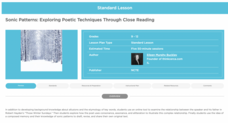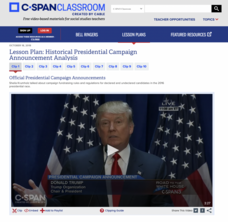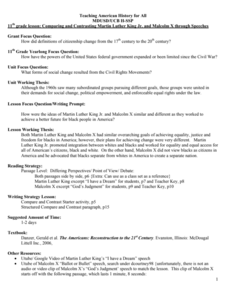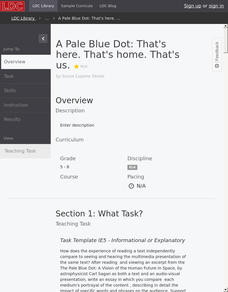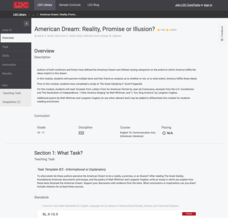ReadWriteThink
Sonic Patterns: Exploring Poetic Techniques Through Close Reading
Robert Hayden's poem "Those Winter Sundays" serves as the anchor text in a five-part lesson that takes the mystery out of poetry analysis by modeling explicit strategies for pupils to employ to conduct a close reading of a poem. After...
K20 LEARN
Watch Your Tone: Tone Analysis Through Music And Nonfiction
Identifying the tone of a piece of writing or the author's attitude toward the subject matter can be difficult for learners. Simplify the process with a lesson that begins with skits, moves to songs and their lyrics, and then to passages...
K20 LEARN
Airplanes and Airstrips, Part 2
Table the decision to land. Pupils form flight crews by matching up different representations of linear equations. Given a set of coordinates for an airstrip, the crews determine the equation of the line that will position their planes...
Health Smart Virginia
Mental Health/Social Emotional Skills
A 7-page packet of activity ideas, lesson plans, and information resources provides instructors of high school freshmen a wealth of materials to support teaching the concepts in a Health Smart unit.
Health Smart Virginia
Health/Social Emotional Skills
Designed for instructors, a seven-page packet provides an overview of the Health Smart unit for eighth-graders. The resource includes the objectives and goals of the unit, details suggested procedures and provides links to additional...
PBS
Hemingway Educator Guide
A 17-page Educator Guide is designed to support classroom discussions of Ken Burns' documentary on Ernest Hemingway. The guide includes background information on Hemingway's life, the themes found in his works, essential and discussion...
Smithsonian Institution
The Birth of an Icon: Learning and Performing the Origins of the Drum Set and Early Jazz Drumming in New Orleans, Louisiana
Bass drum, snare drum, tom-toms, cymbals. Perched behind their drum sets, wielding their drum sticks and wire brushes, drummers lay the grove and are the heartbeat of a band's performance. A dynamic lesson introduces young musicians to...
College Board
Civic Knowledge and Action: Voter Registration
What does the data say? Using provided voter data from the 2016 presidential election, scholars describe the data and identify questions they could answer by analyzing it. Learners then construct tables and use them to determine whether...
Pulitzer Center
The Paradise Papers: A Lesson in Investigative Journalism
The Paradise Papers, a year-long research project from the International Consortium of Investigative Journalism (ICIJ) exposed how political leaders, business people, and wealthy individuals used offshore entities to avoid taxes and hide...
Greater Good Science Center
Nurturing Gratitude From the Inside Out: 30 Activities for Grades K–8
Teach the importance of showing gratitude at any age with a teacher's guide comprised of thirty activities. Browse the extensive table of contents to find the array of exercises designed to meet the needs of your learners. Scholars take...
C-SPAN
Historical Presidential Campaign Announcement Analysis
Using the announcements of presidential candidacies, pupils consider how contenders make their initial arguments to the public. A worksheet helps structure collaborative work to analyze 10 video clips. Writing prompts allow for extension...
Encyclopedia Britannica
Becoming US President
It's that time of year, and the year. Once again the race is on for the White House. It's important that young voters, and would-be voters, understand the process for becoming the United States President. Class members research the...
EngageNY
Solutions to Polynomial Equations
Take a step back to Algebra II. The first instructional activity in a series of 23 asks scholars to remember working with quadratic equations with complex solutions. Pupils apply polynomial identities to complex numbers and work examples...
Facing History and Ourselves
The Challenge of Confirmation Bias
Confirmation bias makes it difficult to overcome our preconceived notions of others. That's the big idea in a lesson that teaches learners strategies to recognize and question their biases.
Facing History and Ourselves
Transcending Single Stories
The focus of the second lesson in the Standing Up for Democracy unit is on the power of assumptions based on a single experience or point of view. Class members begin by journaling about assumptions others make about their identity based...
PBS
Frankenstein: The Consequence of Creation
Famous as a horror story, as the first science fiction novel, Frankenstein is also a tale of ambition, a warning about unbridled science, and responsibility for actions. Readers consider what the tale says of the consequences of creation...
Rancocas Valley Regional High School
Teaching American History for All
Although Dr. Martin Luther King, Jr. and Malcolm X both work for equal rights, social change, and political empowerment, their approaches were radically different. To better understand these contrasts, class members compare King's "I...
PBS
Character vs. Society in The Invisible Man
Ralph Ellison's Invisible Man is difficult to read and difficult to teach. The novel is so highly regarded that it is one of most often listed as an option for the AP Literature and Composition exam. The materials in this packet from PBS...
Literacy Design Collaborative
A Pale Blue Dot: That's Here. That's Home. That's Us.
21st-century learners live in such a visual world that many are unused to letting their minds imagine the picture that words create. An excerpt from Carl Sagan's lecture, "The Pale Blue Dot: A Vision of the Human Future in Space,"...
Pace University
Grade 6-8 Living Things
What characterizes a living thing? Scholars explore the concept during a differentiated instruction unit on living things. They perform lab experiments to determine how animals adapt to stimuli, watch videos and learn about...
Literacy Design Collaborative
American Dream: Reality, Promise or Illusion?
Dream or nightmare? Class members craft a synthesis essay with textual to determine to what extent the United States has fulfilled the ideas embodied in the America Dream.
Benjamin Franklin Tercentenary
Franklin’s Fair Hand American Journalism
Scholars know him for his role in the American Revolution, but Ben Franklin was also a journalist and printer. Learners investigate his standards for what was fit to print using primary sources—including writings where Franklin explains...
The New York Times
Evaluating Sources in a ‘Post-Truth’ World: Ideas for Teaching and Learning about Fake News
The framers of the United States Constitution felt a free press was so essential to a democracy that they granted the press the protection it needed to hold the powerful to account in the First Amendment. Today, digital natives need to...
Council for Economic Education
Satisfaction Please! (Part 3)
Understanding the US government's role proves very important in the American economy, especially for consumers. Scholars learn about how varying government agencies help them when facing an issue. The third and final resource in the...


